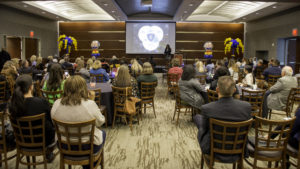UNTHSC helps United Way of Tarrant County outline future direction
March 5, 2019 • Uncategorized
A team of UNTHSC researchers has recently completed a comprehensive community assessment for United Way of Tarrant County that will help set the organization’s strategic direction for years to come.
Findings from this extensive study, which uncovered some of the most pressing social issues affecting the health and prosperity of the Tarrant County population, were recently presented at community meetings around Fort Worth, Arlington and the Mid Cities.
Led by Dr. Emily Spence-Almaguer, Associate Dean for Community Engagement and Health Equity at the UNTHSC College of Public Health, along with Dr. Karen Bell, UNTHSC Assistant Professor of Health Behavior and Health Systems, and Project Director Danielle Rohr, MS, the assessment incorporated months of in-depth, one-on-one interviews and focus groups with local leaders, civic representatives and citizens, to not just address areas of need but analyze and determine the root causes for solving them.
Survey participants ranged from age 18 to 96.
Approximately 67% were female, and the research team traveled throughout Tarrant County to speak with a diversity of residents and stakeholders, reaching 91% of local zip codes.
At two million people and growing, Tarrant County is the third most populous county in Texas and the 16th largest in the United States. Yet, 23% of area families earn less than $35,000, making housing unaffordable for many. In 2018, more than 2,000 people were identified as homeless in Tarrant and Parker counties.
Lack of safe shelter and transportation were found to greatly impact health care access and well-being, and basic needs like food, hygiene, electricity and clothing were often found to be overshadowed by larger issues like employment and education.
Overall, the top identified issues for area residents were found to be housing and homelessness; physical/mental health and wellness; transportation; education, childcare, early childhood and youth services; basic needs, emergency assistance and financial stability.
“Many organizations in the community provide services addressing these different needs,” said Leah M. King, United Way Executive Vice President and Chief Operating Officer, “making the goal of this study to specifically determine the best ways that United Way can support and work alongside these partners to have a greater impact for local individuals and families moving forward.”
“While many of these issues are not new,” she said, “the community assessment highlights how they are interconnected and how they compound challenges for residents and their quality of life. The results of this UNTHSC study have helped provide guidance on how United Way can partner, lead, listen and work in providing future leadership and harnessing resources to solve Tarrant County’s toughest social challenges.”
The research was made possible through a $250,000 grant from the Sid W. Richardson Foundation.



Social media